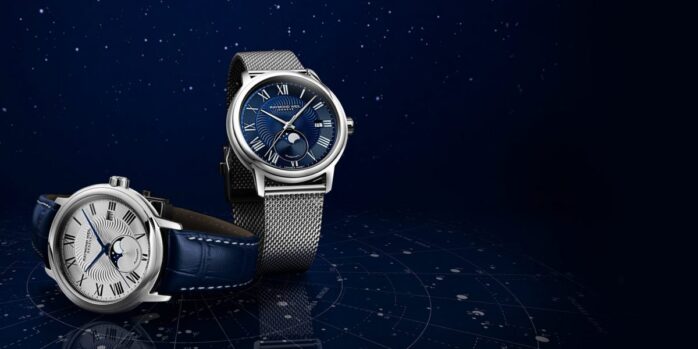
Are you in the mood to treat yourself with a moonphase watch? If you are – you’ve come to the right spot.
Moonphase watches are a thing of beauty, there are no two ways about it, but what concerns most people is – how accurate are they? Well, let’s explore that for a minute.
How Do Moonphase Watches Work?
In order to understand how moonphase watches work, you first need to know a bit about the moon’s cycle. The moon orbits the Earth every 27.3 days and goes through eight phases in that time – new moon, waxing crescent, first quarter, waxing gibbous, full moon, waning gibbous, third quarter and waning crescent. However, the full lunar cycle is 29 and a half days, or to be precise, 29 days, 12 hours, and 44 minutes.
The moonphase mechanism in a watch simulates this exact cycle. It is made up of two moons on a disc driven by a 59-tooth driving wheel.
Why 59? Well, you have two moons on a disc that simulate the moon cycle and phases. So, 29 and a half days for a single cycle, and since you have two moons, you have to multiply that by two, and you end up with 59. Neat, right?
But, as we’ve said a while ago – the full lunar cycle isn’t exactly 29.5 half days long – it’s 44 minutes longer.
How Accurate Are Moonphase Watches?
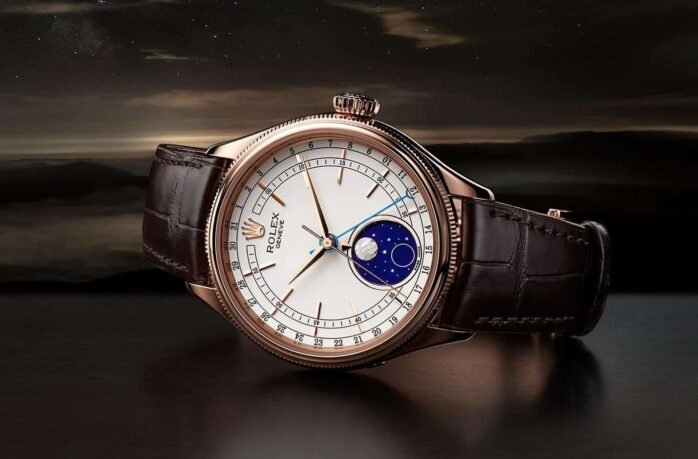
Based on what we just told you and based on what anyone who has ever owned a moonphase watch will tell you – they are notoriously inaccurate. On average, a moonphase watch is off by 44 minutes every month. That’s almost nine hours every year – 8 hours 48 minutes, to be precise. So, what’s the catch? Why would anyone want them?
Even though the moonphase indicator is one of the most delicate and complex mechanisms in a watch, even the best brands can struggle to completely dial it in. So why do we still love them?
For starters, they look amazing. Both bosom and radial moonphase watches look stunning. They are a thing of real beauty, with the delicate details adding an extra level of intricacy and elegance to the design. But more than that, they are a reminder of the endlessly fascinating celestial body that governs our tides and our moods.
But, finally, and most importantly – an everyday wearer doesn’t really care about this inaccuracy. All it takes is a few minutes every once in a while and you can dial your watch back in.
How? Well, we wouldn’t want to bore you with a step-by-step process, because there are other things we want to talk to you about, but if you want to learn how to do that – you can read more about it over here.
And, on top of it all, this only applies to automatic and mechanical timepieces. The quartz (battery-powered watches) are very well calculated, so you won’t have to worry about any of this.
Are All Automatic And Mechanical Moonphase Watches Inaccurate?
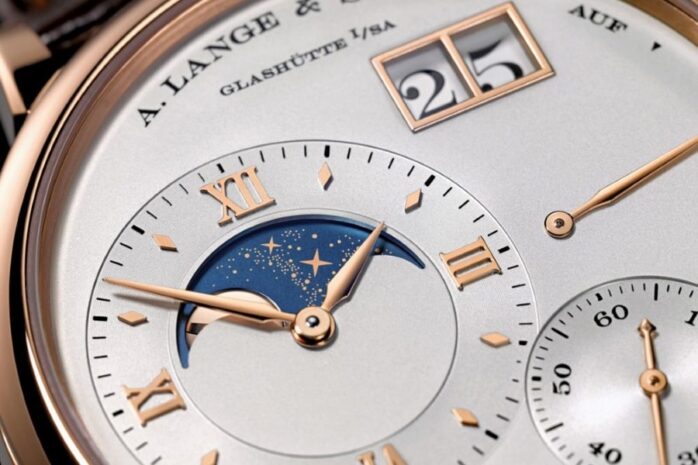
Check this out – not all moonphase watches are this inaccurate. In fact, there are some moonphase watches out there that are astronomically precise. In fact, they’re appropriately dubbed astronomical moonphase watches. These are virtually spot-on accurate.
To put it in numbers, these ones are 99.998% accurate. To put that percentage into perspective, you’d only have to adjust this watch once every 122.6 years.
The thing is, to say these aren’t everyman’s watches would be an understatement. Since this new and improved mechanism is so complex and delicate, these arm candies would set you back anywhere from ten to upwards of a hundred thousand dollars – possibly even a million.
Tips For Choosing A Moonphase Watch
Now that we fully understand all the nuances of a moonphase timepiece, let’s move away from the subject, and focus on what actually matters to most people – how to find a perfect watch.
1. Decide What Type Of Moonphase Watch You Want
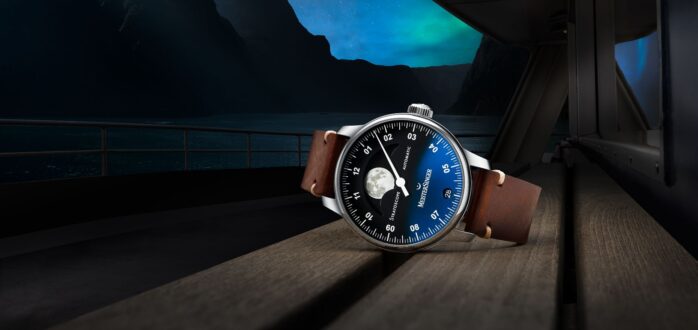
There are two types of moonphase watches: bosom and radial.
The bosom moonphase is the more traditional type, where the moon is set between two humps that represent the earth, and you can physically see the phase the moon is in.
The radial, on the other hand, places them at the 6 o’clock position and instead of the moon moving around – the hand points you towards the phase the moon is in.
2. Consider The Size Of The Watch
Moonphase watches come in a variety of sizes, so you’ll need to choose one that’s comfortable for you to wear. You wouldn’t want something too big or too small.
3. Find The Perfect Material And Color
The material of the watch is important, both for comfort and style. You can find them in a variety of materials, such as stainless steel, gold, and even leather. As for the color, that’s completely up to you.
4. Check The Quality Of The Watch
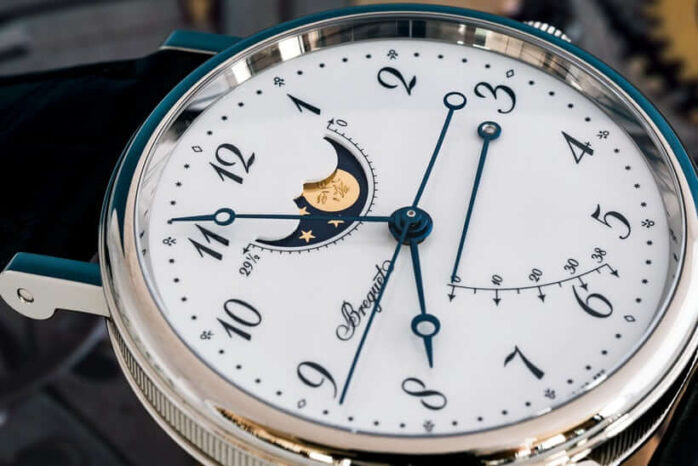
As with any purchase, you’ll want to make sure you’re getting a quality product. You’ll spend quite a bit of money on this watch, so you better make sure you get a quality item in return.
5. Compare Prices
Moonphase watches can range in price from a few hundred dollars to several thousand dollars. Sure, an Omega will be more expensive than a Christopher Ward, but that doesn’t necessarily mean it’s a better watch for you. Take your time and find the one that suits you best.
6. Read Reviews
Before purchasing a moonphase watch, read online reviews to get an idea of what others think of the product. Watch community is a very critical one, so you can be quite certain that if you read a review from a reputable source – you’ll get accurate info.
7. Ask Questions
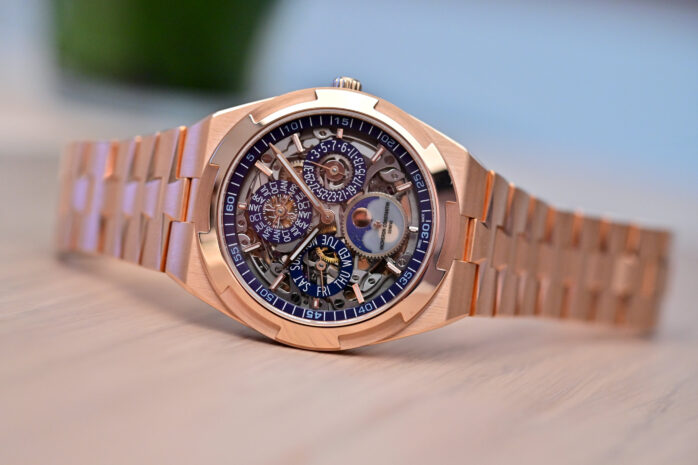
If you have any questions about moonphase watches, don’t hesitate to ask a salesperson or do some research online. That is probably the only way to ensure you get what you want.
Conclusion
So, in summation, moonphase watches are amazing timepieces that have a century-long history. They’re quite complex and beautiful to look at which is what makes them so appealing.
Sure, they’re not the most accurate unless they’re mind-bogglingly expensive – but do you really care about a few minutes every now and then? We didn’t think so.











